Curious about the safety of energy drinks for kids? As a dietitian mom, I help you uncover the potential risks of excessive caffeine, dehydration, and displacing nutritious foods.
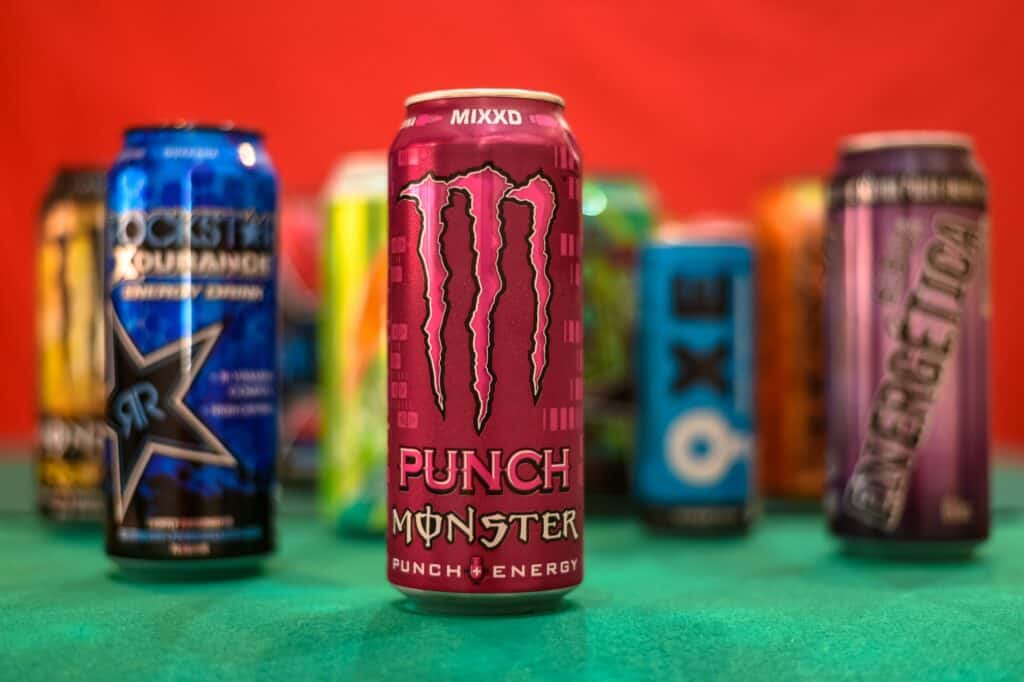
In today’s fast-paced world, energy drinks have gained popularity among individuals of all ages. However, concerns have been raised regarding the safety of these highly caffeinated beverages for children and youth. As a dietitian and parent myself, it is crucial to understand the potential risks associated with energy drinks. In this blog post, we’ll delve into the topic and provide insights into whether energy drinks are safe for children.
How are energy drinks classified?
First, let’s start with how energy drinks are classified. In 2011, the Canadian government decided to classify energy drinks as “foods” rather than “natural health products” or “drugs”. What that means, is that energy drinks must have food labels and ingredients lists, just like all other packaged food. There will be limits for amounts of vitamins and minerals allowed in each beverage and statements that indicate they are not recommended for children, and pregnant or breastfeeding women.
This is a step in the right direction I guess. It increases awareness as far as what exactly is in the energy drink and how much caffeine it contains, but is this really going to deter kids from drinking them? I doubt it. Food marketing and social media influencers have a massive strong hold on our purchasing habits, and kids are no exception.
What it may do, is increase awareness for parents who can somehow limit how many energy drinks their kids consume (when they’re at home that is). The new regulations also limit the amount of caffeine that goes into one energy drink- 180 mg maximum/drink.
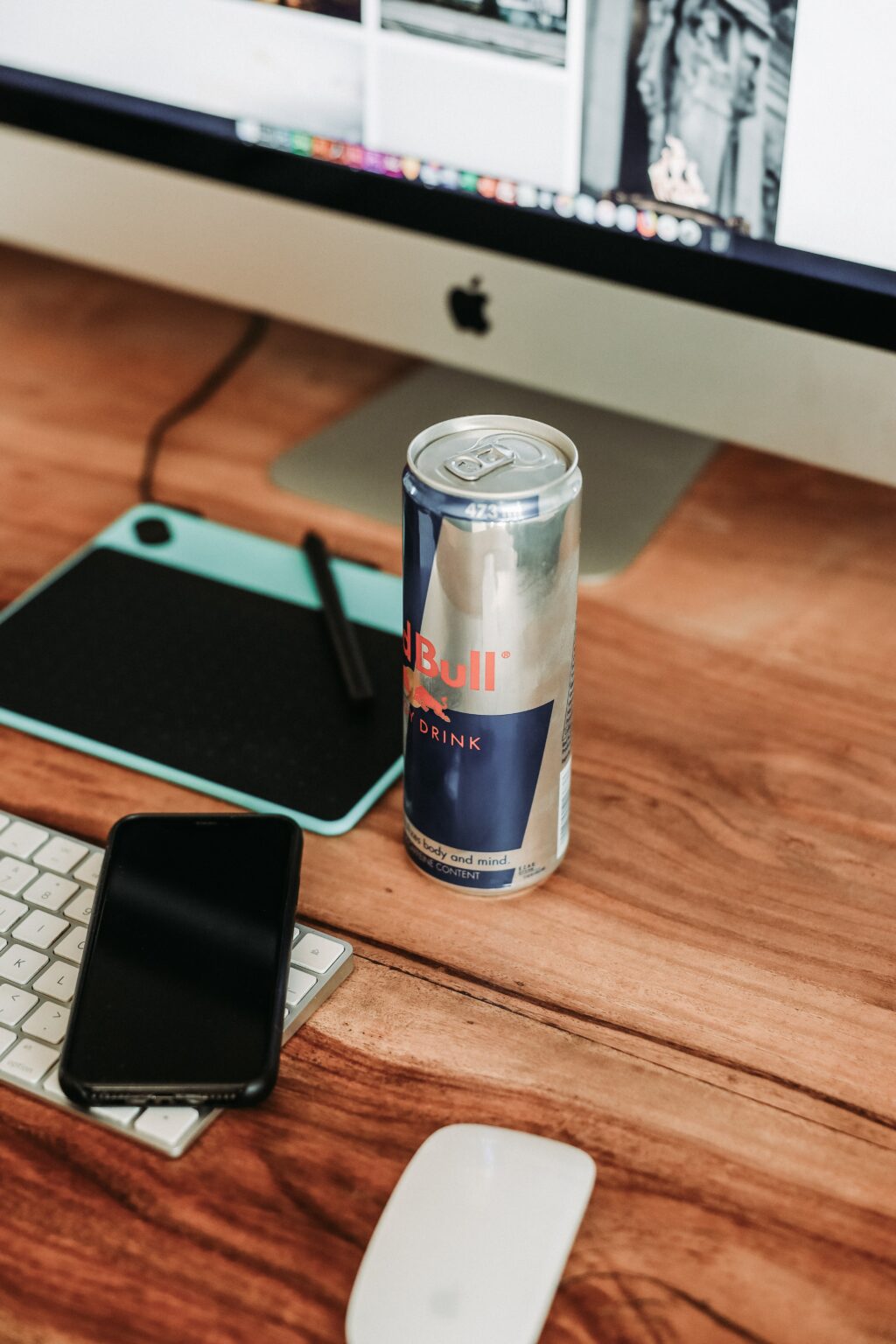
Why Energy Drinks are not Recommended for Kids and Teens
Energy drinks typically contain high levels of caffeine, added sugars, and other stimulating ingredients like taurine and guarana. The combination of these ingredients is intended to provide an instant energy boost and combat fatigue. Sounds good, right? However, it’s important to note that the caffeine content in energy drinks is significantly higher than that found in other commonly consumed beverages, such as soda or tea. In addition, we’re dealing with growing bodies and brains here.
How much Caffeine can Kids Consume Safely?
Children ages 7-9 should be getting no more than 62mg of caffeine per day and kids ages 10-12 should be consuming no more than 85 mg of caffeine per day! So consuming just one energy drink per day means that these kids are getting more than double their upper limit (UL) of caffeine per day.
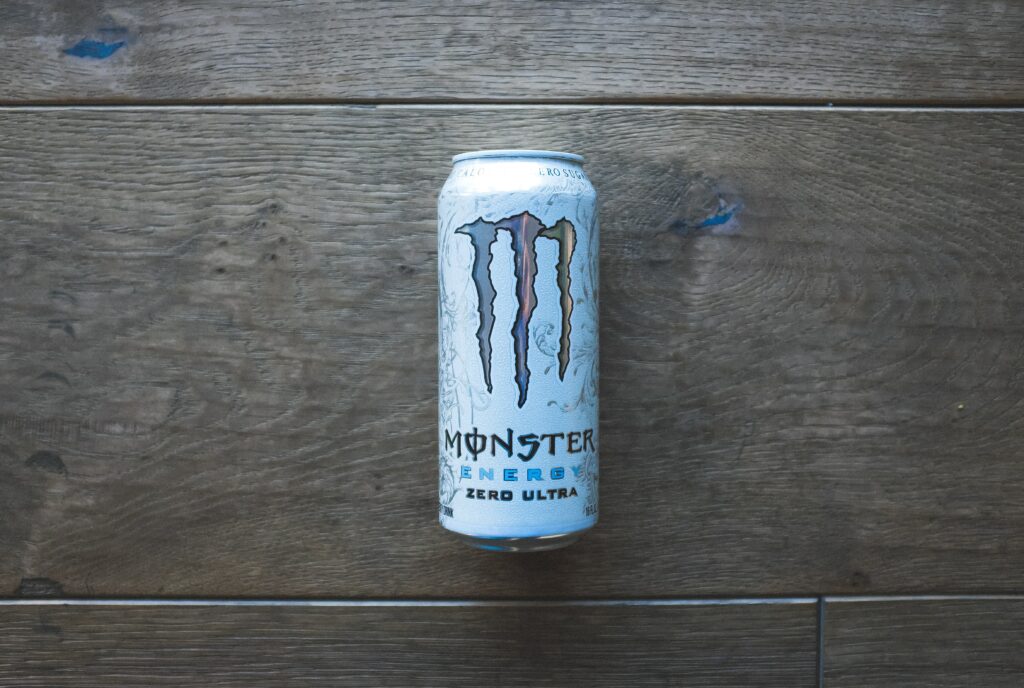
Potential Risks for Kids and Teens
Caffeine Overload:
The excessive caffeine in energy drinks can pose various risks for children, including increased heart rate, high blood pressure, irritability, nervousness, and difficulty sleeping. Moreover, children may have a lower tolerance for caffeine, making them more susceptible to its adverse effects.
Dehydration:
Many energy drinks have diuretic properties, leading to increased urine production and potential dehydration. This risk is particularly significant when consumed during physical activities or in hot weather, as children may not recognize signs of dehydration and fail to hydrate adequately. If you’re curious about sports drinks for kids, here’s my take on Prime Hydration for kids.
Nutritional Concerns:
Long term, consuming caffeinated beverages such as energy drinks can lead to nutrient deficiencies. These drinks are replacing nutritious, more hydrating beverages such as milk, water and 100% fruit juice. Caffeine in large amounts can negatively impact proper growth and development.
Interference with Sleep Patterns:
The stimulating effects of energy drinks can disrupt a child’s sleep patterns, leading to inadequate rest and potential difficulties in concentration, learning, and overall well-being.
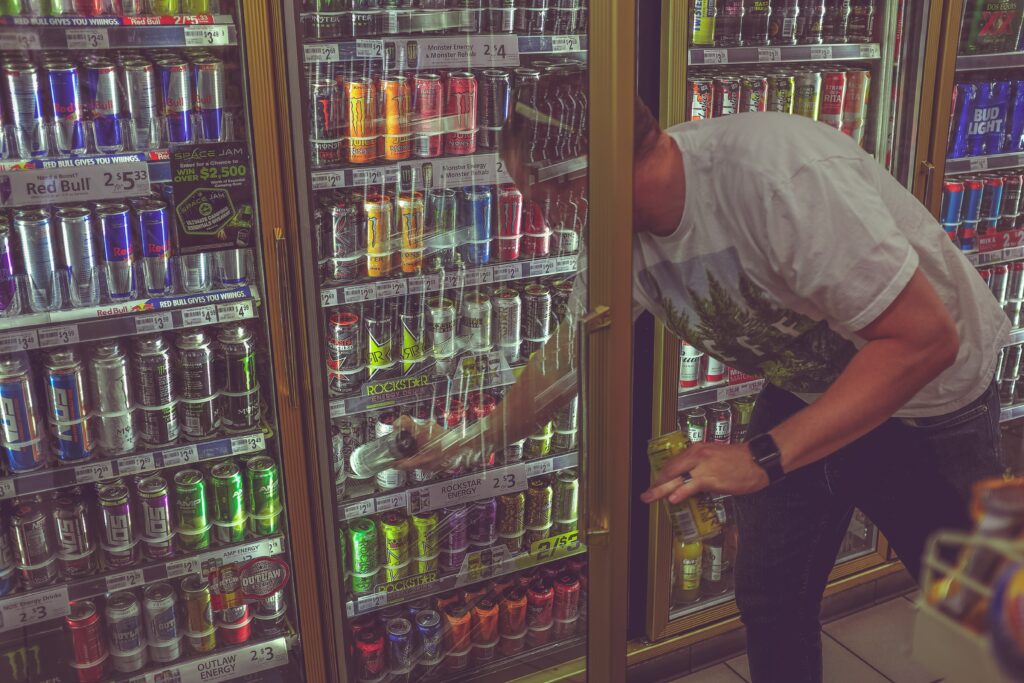
Guidelines for Parents and Caregivers
Knowing all of this, what can us parents and caregivers do? Here are some tips:
Set Boundaries:
First things’ first, follow the Division of Responsibility in feeding. Establish clear boundaries regarding energy drink consumption. Whenever possible, offer nutritious alternatives like water, milk, or natural fruit juices to quench thirst and provide essential nutrients.
Educate:
If your child is old enough (teen years and beyond), you can begin to talk to them about nutrition. Inform your child about the potential risks associated with energy drinks, explaining the reasons why their consumption may not be suitable for their age group. That said, we need to provide this education in a compassionate, food neutral way.
Read Labels:
Pay close attention to the nutritional information and caffeine content on beverage labels. Encourage your child to make informed choices and be aware of the potential consequences of excessive caffeine intake.
Promote Better Sleep:
The best way to boost your energy? Good old fashioned sleep. Help your child explore healthier alternatives for increased energy, such as getting sufficient sleep, consuming nutritious snacks and taking short breaks to stretch and relax.
Bottom Line
While energy drinks may offer temporary energy boosts, their consumption among children and youth raises valid concerns. Due to the potential risks associated with excessive caffeine intake, dehydration, nutrient displacement, and disrupted sleep patterns, it is generally recommended to limit or avoid energy drinks for teens. As parents, we can help our teens by role modeling eating a variety of foods and the importance of getting enough sleep, all of which can go a long way in ensuring their overall development and happiness.
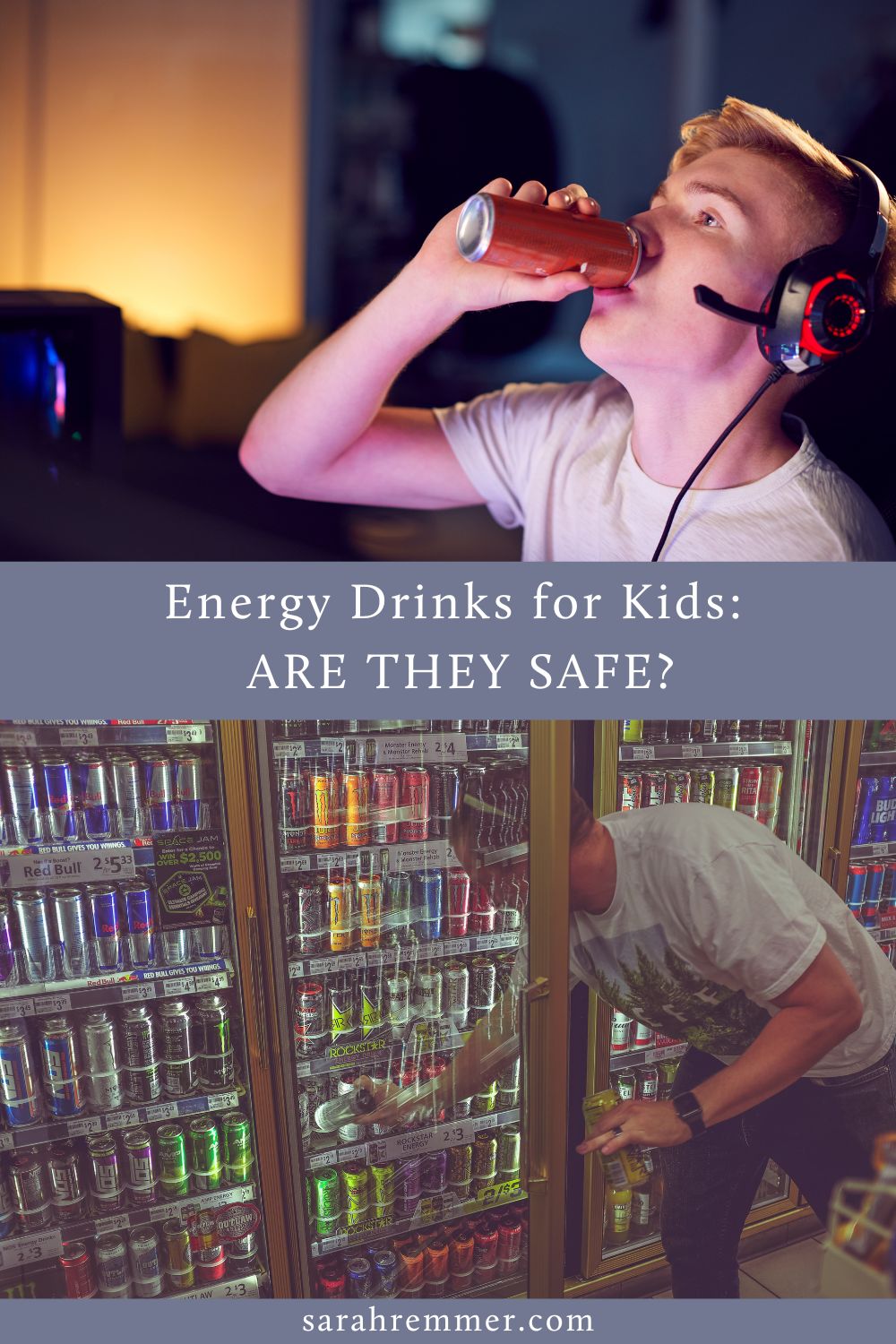




![[AD] It’s Day 6 of my 15-Minute Supper Series and today we’re putting a delicious twist on a classic BLT to make it nourishing and meal-worthy 🤤
Make sure to comment “Spud” and I’ll send you my top dietitian tips for feeding your family on busy weeknights along with a huge list of meal ideas!
This pasta salad takes no time at all to throw together and has everything you need for a nourishing meal. I always make extra bacon for things like this, but if you don’t have any cooked bacon I find cooking it in the airfryer or stovetop the quickest 🥓
I find that this salad lasts 2-3 days in the fridge without getting too soggy. You can also add in fresh lettuce to crisp it up or add the dressing when you eat it.
I ordered all of my groceries from @spuddelivers, which always saves me time and effort and gives me peace of mind knowing that I’m using high-quality, local and sustainable ingredients. I love that they come straight to my door the day after ordering 🙌🏻
Let’s make it!
Ingredients:
* 10 slices bacon cooked and diced
* 12 ounces pasta cooked and cooled
* 1 cup homemade Ranch dressing
* 1 ½ cup baby tomatoes diced
* ½ avocado diced
* feta
* ⅓ cup red onion diced
* 1 cup romaine lettuce
* fresh parsley for garnish optional
Homemade ranch dressing:
* ¾ cup mayonnaise
* ½ cup sour cream or Greek yogurt
* ½ teaspoon dried chives
* ½ teaspoon dried parsley
* ½ teaspoon dried dill weed
* ¼ teaspoon garlic powder
* ¼ teaspoon onion powder
* Salt and pepper to taste
Make it:
1. Blend all Ranch dressing ingredients together in a small blender (or whisk by hand) and set aside.
2. In a large bowl assemble the pasta, tomatoes, avocado, cheese, red onion, lettuce and bacon.
3. Pour the dressing over and toss to combine.
4. Garnish with parsley and serve.
You are going to LOVE this meal-worthy salad, I promise!
Comment SPUD to receive my top dietitian-approved tips for feeding your family during the week, a long list of ideas, and a curated shopping list with all of the ingredients for this recipe + all of the other ideas that I share in this resource!
#sponsored #spuddelivers #15minutemeals #whatsfordinner #easymealideas #dietitianapproved](https://www.sarahremmer.com/wp-content/uploads/sb-instagram-feed-images/438745920_798281295514125_2547899647147267180_nfull.jpg)



Leave a Comment